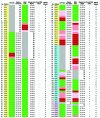ERG oncoprotein expression in prostate carcinoma patients of different ethnicities
- PMID: 25469265
- PMCID: PMC4251096
- DOI: 10.3892/mco.2014.418
ERG oncoprotein expression in prostate carcinoma patients of different ethnicities
Abstract
Overexpression of the erythroblast transformation-specific-related gene (ERG) oncoprotein due to transmembrane protease, serine 2 (TMPRSS2)-ERG fusion, the most prevalent genomic alteration in prostate cancer (CaP), is more frequently observed among Caucasian patients compared to patients of African or Asian descent. To the best of our knowledge, this is the first study to investigate the prevalence of ERG alterations in a multiethnic cohort of CaP patients. A total of 191 formalin-fixed paraffin-embedded sections of transrectal ultrasound-guided prostate biopsy specimens, collected from 120 patients treated at the Sime Darby Medical Centre, Subang Jaya, Malaysia, were analyzed for ERG protein expression by immunohistochemistry using the anti-ERG monoclonal antibody 9FY as a surrogate for the detection of ERG fusion events. The overall frequency of ERG protein expression in the population evaluated in this study was 39.2%. Although seemingly similar to rates reported in other Asian communities, the expression of ERG was distinct amongst different ethnic groups (P=0.004). Malaysian Indian (MI) patients exhibited exceedingly high expression of ERG in their tumors, almost doubling that of Malaysian Chinese (MC) patients, whereas ERG expression was very low amongst Malay patients (12.5%). When collectively analyzing data, we observed a significant correlation between younger patients and higher ERG expression (P=0.04). The prevalence of ERG expression was significantly different amongst CaP patients of different ethnicities. The higher number of ERG-expressing tumors among MI patients suggested that the TMPRSS2-ERG fusion may be particularly important in the pathogenesis of CaP amongst this group of patients. Furthermore, the more frequent expression of ERG among the younger patients analyzed suggested an involvement of ERG in the early onset of CaP. The results of this study underline the value of using ERG status to better understand the differences in the etiology of CaP initiation and progression between ethnic groups.
Keywords: Malaysia; prostate cancer; serine 2-erythroblast transformation-specific-related gene fusion; transmembrane protease.
Figures


Similar articles
-
Low Frequency of the ERG Oncogene Alterations in Prostate Cancer Patients from India.J Cancer. 2013 Jul 5;4(6):468-72. doi: 10.7150/jca.6568. Print 2013. J Cancer. 2013. PMID: 23901346 Free PMC article.
-
Predominance of ERG-negative high-grade prostate cancers in African American men.Mol Clin Oncol. 2014 Nov;2(6):982-986. doi: 10.3892/mco.2014.378. Epub 2014 Aug 7. Mol Clin Oncol. 2014. PMID: 25279185 Free PMC article.
-
The prognostic and predictive value of TMPRSS2-ERG gene fusion and ERG protein expression in prostate cancer biopsies.Dan Med J. 2016 Dec;63(12):B5319. Dan Med J. 2016. PMID: 27910803 Review.
-
Increased association of the ERG oncoprotein expression in advanced stages of prostate cancer in Filipinos.Prostate. 2014 Aug;74(11):1079-85. doi: 10.1002/pros.22791. Epub 2014 Jun 9. Prostate. 2014. PMID: 24909781
-
Clinical applications of novel ERG immunohistochemistry in prostate cancer diagnosis and management.Adv Anat Pathol. 2013 Mar;20(2):117-24. doi: 10.1097/PAP.0b013e3182862ac5. Adv Anat Pathol. 2013. PMID: 23399797 Review.
Cited by
-
TMPRSS2:ERG Gene Fusions in Prostate Cancer of West African Men and a Meta-Analysis of Racial Differences.Am J Epidemiol. 2017 Dec 15;186(12):1352-1361. doi: 10.1093/aje/kwx235. Am J Epidemiol. 2017. PMID: 28633309 Free PMC article.
-
TMPRSS2-ERG gene fusion in Turkish patients with localized prostate cancer: results of radical prostatectomy specimens.Turk J Urol. 2016 Jun;42(2):60-3. doi: 10.5152/tud.2016.94763. Turk J Urol. 2016. PMID: 27274888 Free PMC article.
-
Ethnicity and ERG frequency in prostate cancer.Nat Rev Urol. 2018 Feb;15(2):125-131. doi: 10.1038/nrurol.2017.140. Epub 2017 Sep 5. Nat Rev Urol. 2018. PMID: 28872154 Review.
-
RGS12 Is a Novel Tumor-Suppressor Gene in African American Prostate Cancer That Represses AKT and MNX1 Expression.Cancer Res. 2017 Aug 15;77(16):4247-4257. doi: 10.1158/0008-5472.CAN-17-0669. Epub 2017 Jun 13. Cancer Res. 2017. PMID: 28611045 Free PMC article.
-
Autoantibodies against oncogenic ERG protein in prostate cancer: potential use in diagnosis and prognosis in a panel with C-MYC, AMACR and HERV-K Gag.Genes Cancer. 2016 Nov;7(11-12):394-413. doi: 10.18632/genesandcancer.126. Genes Cancer. 2016. PMID: 28191285 Free PMC article.
References
-
- Zainal Ariffin O, Nor Saleha IT. Cancer Registry Report 2007. Malaysia: 2011. Nationa.
-
- Othman NH, Nor ZM, Biswal BM. Is Kelantan joining the global cancer epidemic? - experience from hospital Universiti Sains Malaysia; 1987–2007. Asian Pac J Cancer Prev. 2008;9:473–478. - PubMed
-
- Mononen N, Schleutker J. Polymorphisms in genes involved in androgen pathways as risk factors for prostate cancer. J Urol. 2009;181:1541–1549. - PubMed
LinkOut - more resources
Full Text Sources
Other Literature Sources
Miscellaneous
